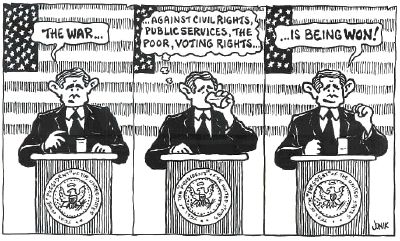|
||||
|
|
|
|||
| Home | Subscribe | Back Issues | The Organization | Volunteer | Do Something | ||||
|
||||
|
Bush Breaks Economic Records By Don Monkerud
President Bush and the GOP are attempting to divert attention from a disastrous war as they tout their economic successes. The GOP cites the stock market at a six-year high, a 16 percent growth in GNP, the lowest gas prices in ten months, and a 1.5 percent increase in home ownership since Bush was elected. Bush basks in a $296 billion deficit and claims that his tax cuts led to a booming economy. The president could brag about many other records his Administration set. Corporate profits are at record levels; banks, oil and insurance companies announced record profits and corporate taxes fell to record lows. The Commerce Department reported that the Standard & Poor's 500 companies more than doubled their profits between 2001 and 2005--a record since data collecting began in 1947. Collectively, profits amounted to over $1 trillion since 2001. Corporations relied upon cheap labor from overseas, kept domestic wages low, and increased productivity. Meanwhile, increased consumer and government debt, low taxes, deregulation, and a lack of oversight helped boost corporate bottom lines. The Wall Street Journal said, "company coffers are brimming with cash, buoyed by corporate profits that have grown at double-digit rates for a record 15 consecutive quarters." Banks raked in record-breaking profits of $120.6 billion in 2003, 15 percent over the previous high profits set in 2002. Citigroup, the world's largest bank, announced $18 billion in profit. Bank of America, the world's second-largest bank, reported $10.8 billion in profit. The next three largest banks, JP Morgan, Bank One and Wells Fargo, collectively reported $16.4 billion in profit. Bank profits now amount to one-third of all company profits, according to The Banker magazine, up from less than 5 percent 20 years ago. After rejecting many claims and covering only 30 percent of the damages of Hurricane Katrina, insurance companies reaped $45 billion in profits in 2005 and expect a record profit of $60 billion in 2006. The GOP helped insurance companies by deregulation and shifting financial risks from business to individuals and the government. Increasingly, states pick up financial losses after a natural disaster, and insurance companies are allowed to cover less damage. Frank W. Nutter, president of the Reinsurance Assn. of America, a Washington trade group, told the Los Angeles Times, "We've been through some of the worst natural disasters and man-made catastrophes in our history, and had some of the best earnings in the last 20 or 30 years." Oil profits soared as oil prices doubled over the past three years. Oil reached a record $78 a barrel, gas prices broke one record after another, and, in January 2006, Exxon Mobil announced record profits for 2005 of $36 billion on $371 billion in sales, a record revenue for any American company ever. Profits rose 40 percent over previous record profits set in 2004, and this October, Exxon announced $10.49 billion in profit, the second-largest quarterly profit in their history. Chevron also announced $5 billion in profit in October, their highest quarterly profit ever, overshadowing the former high set during the previous quarter. Bush augmented corporate oil profits by cutting $2 billion off their taxes with his energy bill last November, and the GOP helped oil profits last fall by cutting their taxes $60 billion over the next five years. Higher prices for oil are a result of Bush's disastrous invasion of Iraq, a booming economy in Communist China providing cheap goods for America, and higher profit margins at oil refineries. Corporate profits soar with annual tax cuts from Bush and the GOP, which provides US companies with one of the most favorable corporate tax codes in the world. While the official tax rate on corporations is 35 percent, they actually paid an average of 18 percent in 2004, compared to 20 to 22 percent paid by 15 Western European nations since 1988. As a percentage of Gross National Product (GNP), the US pays a record low percentage of 2.1 percent in taxes, compared to 3.2 in the EU and 4.3 in industrialized Asia. Other possible records set in five years under Bush include 143 percent increase in crude oil prices, 71 percent increase in gasoline prices, 46 percent increase in natural gas prices, a $2000 average increase in yearly energy bills for the typical family (to a record $5100), and a record 65 percent increase in dependence on foreign oil. The median hourly wage, adjusted for inflation, fell 2.5 percent from 2000 to 2005, and fell 10 percent over the past 30 years. It now make ups the lowest share of the nation's GNP since data collection began in 1947.
Meanwhile, the average CEO took home 431 times the average worker's pay in 2004, 80 percent of Bush's tax cuts flowed to the wealthiest 10 percent, and the wealthiest 1 percent owned almost 60 percent of all corporate wealth in 2003. The consequences of Bush's policies are dire for the majority of Americans, but with a smile and prayer, he ignores them. Copyright 2006 Don Monkerud. |
